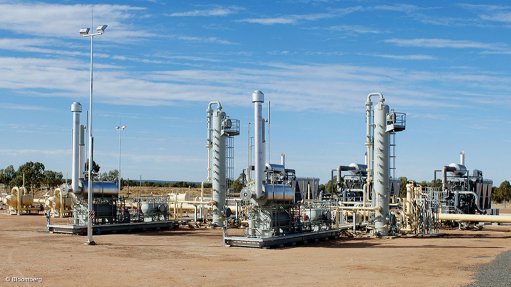
Photo by: Bloombeg
PERTH (miningweekly.com) – The Queensland Resources Council (QRC) has called on Australian politicians to stand up for the oil and gas industry against unrelenting attacks from environmental groups.
Speaking at the Queensland Gas Conference, QRC CEO Michael Roche said this week that the A$70-billion Queensland gas sector provided about 5% of the state’s jobs and contributed A$22.1-billion to the economy, as well as 7% of the state’s regional product.
“Despite being the lynchpin of the Queensland economy and one of the state’s biggest employers, resources development is under constant attack from green activists,” Roche said.
Roche noted that scaremongering tactics from politically or fundraising motivated activists have sought to mislead the community on the impacts of fracture stimulation, a practice that has been part of the global petroleum industry for more than 40 years.
“Fracture stimulation continues to be accused without scientific foundation of threatening groundwater, rivers, the Great Barrier Reef and human health. Yet, time and again, scientific inquiry comes to the same conclusion: the technical challenges and risks of fracture stimulation can be managed through a well-designed regulatory regime, underpinned by effective monitoring and enforcement of compliance.”
He pointed out that Australia had some of the best environmental regulations in the world, and had been using fracture stimulation techniques for decades, adding that there were nearly 7 000 active exploration and production wells in Queensland, and since 2011, there had been less than 500 fracture stimulations.
“It’s time that we as an industry face the public perception challenges before us because the risk is much greater than reputation; the risk is poor policy.”
Roche said if green activists succeeded in turning land access laws on their head, it would be “a sure recipe for driving resource investment from our state, and from the nation”.
Roche said that current land access laws in Queensland struck a fair balance between providing the community with benefits from the development of the state’s resources, and respecting the rights of farmers to keep running their business.
“No one is saying that companies should have the right to place gas wells and associated infrastructure where it suits them. And it’s just not about gas. Farmers should have the right to determine who can come onto their land and when, whether they be in search of gas, minerals or coal.”
Roche noted that under the current legislation, resource companies were required by law to understand a farmer’s business and how they might affect that business before they enter the land, and to meet farmers' reasonable valuation, legal and accounting costs. They were also required to arrange compensation for any impacts on the farmer’s business which both parties must agree to before any impacts occur.
“In Queensland more than 5 000 conduct and compensation agreements have been struck since the Land Access Framework was put into effect in 2010. Under these agreements farmers have negotiated compensation agreements totalling hundreds of millions of dollars.”
“The reality is that current land access laws provide landholders the opportunity to negotiate terms that can ensure farms either operate at the same, but more likely, at an improved output. These negotiations can be difficult and complex for the farmers involved, but at a time of widespread drought and soft prices at the farm gate, income from hosting gas infrastructure is playing a role in helping these communities ride out the drought.”
However, Roche noted that some politicians had opted for the easy populist position, and in doing so have suggested that it was appropriate for individuals to block the extraction of resources.
“They should know better. In effect, they are arguing against the property rights enshrined in our Constitution, rights that confirm the resources belong to each and every one of us. Those politicians have an obligation to calmly explain the difference between the crude right of veto and the more useful right to have a say in how and when land may be accessed.”
Roche noted that explaining the facts of fracturing and land access agreements may draw rebuke from professional activists, but this was a necessary step if investment in the Queensland resources sector was to be maintained.